Having a functioning car air conditioner is essential for a comfortable driving experience, especially during hot summer months. However, over time, the air conditioning system in your car may lose its efficiency and start blowing warm air instead of the cool breeze you expect. This is a common issue that many car owners face, and it is often an indication that your car's air conditioning system needs a regas.
Reasons for Car AC Not Blowing Cold Air
Before we dive into the symptoms that indicate the need for a car air conditioning regas, let's understand why your car's AC may stop blowing cold air.
1. Low Refrigerant Levels: One of the most common reasons for a car AC not blowing cold air is low refrigerant levels in the system. Refrigerant is the substance responsible for cooling the air, and if it is running low, the AC system won't be able to produce cold air effectively.
2. Leaks in the AC System: Another reason for a drop in refrigerant levels is the presence of leaks in the AC system. Over time, small leaks can develop in the hoses, connections, or seals of the system, causing refrigerant to escape. This results in insufficient cooling and the need for a regas.
3. Faulty Compressor: The compressor is an important component of the car's AC system, as it compresses the refrigerant to a high pressure, allowing it to cool the air. A faulty compressor can lead to a lack of cooling and require a regas to fix the issue.
4. Clogged or Blocked Condenser: The condenser is responsible for removing heat from the refrigerant, allowing it to cool the air. If the condenser becomes clogged with dirt, debris, or other contaminants, it can impede the heat transfer process and result in warm air blowing from the AC vents.
Signs of Low Refrigerant in Car AC
Now that we understand the possible reasons behind a car AC not blowing cold air, let's discuss the common symptoms that indicate low refrigerant levels in your car's AC system:
1. Warm Air from Vents: The most obvious sign of low refrigerant levels is when the air blowing from the vents is warmer than usual. This indicates that the system does not have enough refrigerant to cool the air effectively.
2. Reduced Airflow: Another symptom is reduced airflow from the vents. You may notice that the air coming out is not as strong as it used to be, even when the fan speed is set to the maximum.
3. AC Compressor Constantly Running: If the AC compressor is constantly running without cycling on and off, it could be a sign of low refrigerant levels. The compressor tries to compensate for the lack of refrigerant by working harder, which can lead to increased wear and tear on the system.
4. Leaking Refrigerant: In some cases, you may notice a puddle of refrigerant under your parked car. This is a clear indication of a refrigerant leak and should be addressed promptly to prevent further damage to the AC system.
5. Unusual Noises: A car AC system with low refrigerant levels may produce strange noises, such as hissing or bubbling sounds. These noises typically occur due to the refrigerant leaking from the system.
Air Con Regas: What to Expect
If you're experiencing any of the symptoms mentioned above, it's essential to get an air conditioning repair for your car. A regas involves recharging the AC system with the right amount of refrigerant to restore its cooling efficiency. Here's what you can expect during an air con regas:
1. Inspection: A professional technician will inspect the AC system for leaks, damaged components, or any other issues that may need to be addressed before the regas process begins.
2. Evacuation: The technician will evacuate any remaining refrigerant from the system using specialized equipment. This step ensures that only the correct amount of refrigerant is added during the regassing process.
3. Leak Detection: Once the system is evacuated, the technician will inspect the AC components for leaks using tools like UV dye or electronic leak detectors. If any leaks are found, they will be repaired before proceeding.
4. Recharging: After the inspection and leak detection, the technician will recharge the AC system with the appropriate amount of refrigerant, following the manufacturer's specifications. They will also add any necessary oils or dyes to ensure optimal performance.
5. Performance Test: Once the regas is complete, the technician will perform a performance test to ensure that the AC system is operating correctly and blowing cold air. They will also check the airflow, temperature, and overall functionality of the system.
Car Air Con Regas: Frequency and Maintenance Tips
To keep your car's AC system running smoothly and avoid the need for frequent regassing, here are some maintenance tips:
1. Regular Maintenance: Follow the manufacturer's recommended maintenance schedule for your car's AC system. This includes regular inspections, leak detection, and regassing as needed.
2. Use the AC System Year-Round: It's beneficial to use the AC system regularly, even during colder months, to keep the refrigerant flowing and prevent seals and hoses from drying out.
3. Keep the System Clean: Regularly clean the condenser and air filters to ensure optimal airflow and prevent debris from clogging the system.
4. Address Leaks Promptly: If you notice any signs of a refrigerant leak, such as a decrease in cooling efficiency or puddles under your car, have it inspected and repaired as soon as possible to prevent further damage to the AC system.
5. Seek Professional Help: When it comes to diagnosing and repairing AC system issues, it's best to consult a professional technician with the necessary knowledge and equipment. They can accurately diagnose the problem and perform the regas to restore your car's AC system to its optimal condition.
How Service My Car Assists You?
Have you reached a point where you're questioning, "Where can I find the top garage in Bolton for my car?" Look no further. At Service My Car, we provide premium car servicing, repair, and maintenance services, always within your reach. With specialized service offerings for the car and comprehensive service packages, we ensure the collection and drop-off of your vehicle following its maintenance.
In conclusion, if you're experiencing warm air blowing from your car's AC vents or notice any other symptoms of low refrigerant levels, it's important to get an air conditioning regas. Regular maintenance and prompt attention to any issues can help keep your car's AC system in top shape, ensuring a comfortable and cool driving experience even on the hottest days.
We offer everything you need and much more, with a simple digital solution. Our all-in-one platform covers all your Gmc servicing and
gmc service bolton needs, regardless of what Gmc repair you require. Rest assured, as we take quality assurance very seriously. We periodically check all our partner garages to ensure they're following protocol and maintaining the highest standards when it comes to Gmc maintenance.






